Celebrating 40 years of the European Chess Union: A legacy of unity, growth, and excellence

FIDE and the global chess community warmly congratulate the European Chess Union (ECU) on the momentous occasion of its 40th anniversary. Founded in 1985 in Graz, Austria, the ECU has grown into one of the most active and influential continental federations within FIDE, uniting 54 national chess federations across Europe. Over the past four decades, the ECU has played a vital role in advancing chess at all levels — from grassroots and school programs to elite competitions. It has organized countless continental events, including its flagship European Individual Championships and the European Club Cup, as well as numerous team and youth tournaments, helping to shape generations of European chess talents. Beyond the board, the ECU has championed innovation and inclusivity, promoting educational chess initiatives and gender equality in the sport. “I hope that FIDE and the ECU will work together to rebuild and refresh the foundation of European chess in the years to come. FIDE is ready to partner with you and assist in this endeavor. We are committed and await the guidance of this General Assembly on what we should prioritize next year to promote chess in Europe and globally,” said FIDE President Arkady Dvorkovich at the ECU General Assembly, held during the European Team Championship in Batumi. The FIDE President was the guest of honor at Saturday night’s gala celebrating the European Chess Union’s 40th anniversary. In recognition of their efforts and contributions, Arkady Dvorkovich presented ECU President Zurab Azmaiparashvili and ECU Secretary General Theodoros Tsorbatzoglou with the FIDE Medal of Merit. As the ECU enters its fifth decade, it continues to look ahead with ambition — building on a rich legacy of excellence, cooperation, and passion for chess. Happy 40th Anniversary to the European Chess Union!
European Team Championship 2025: Ukraine and Poland lead with three rounds to go
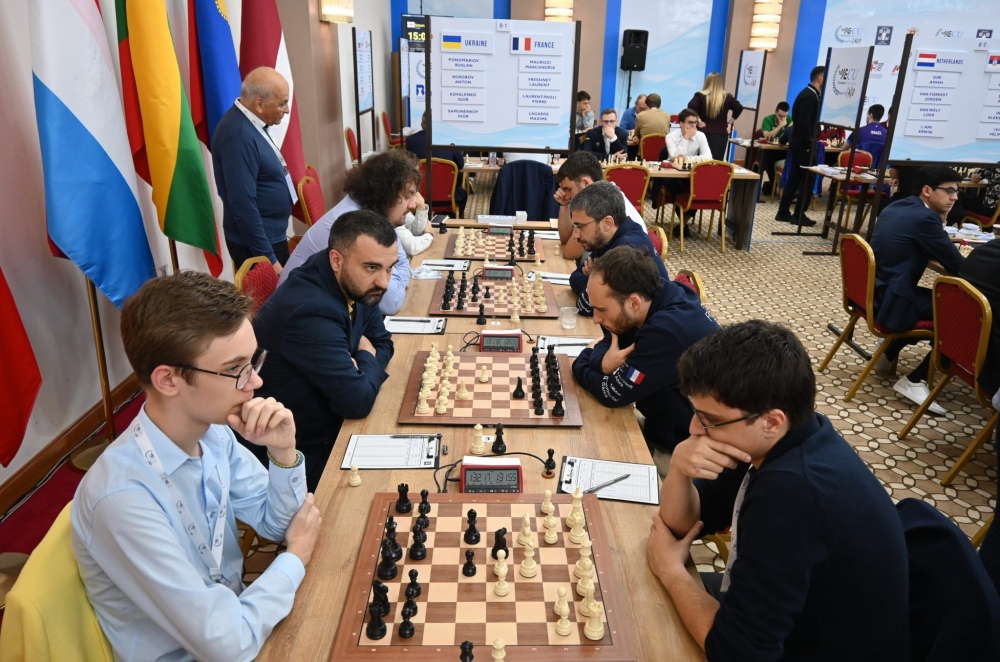
After Round 6 of the European Team Chess Championship 2025 in Batumi, Georgia, Ukraine and Poland hold the sole leads in the Open and Women’s sections, respectively. Ukraine scored a narrow victory over France, thanks to GM Igor Kovalenko (UKR, 2669), who defeated GM Pierre Laurent-Paoli (FRA, 2570). GM Ruslan Ponomariov (UKR, 2633) had a promising opportunity to score a full point against GM Marc’Andria Maurizzi (FRA, 2624) but missed the key idea to transpose into a winning pawn endgame, and the game ended in a draw. The encounters on the second and fourth boards were solid and also concluded in draws. With this result, Ukraine preserved its sole lead in the tournament with 11/12 match points. The Netherlands emerged victorious against Serbia, posting a convincing 3–1 win to stay within striking distance of the leaders. GM Anish Giri (NED, 2759) defeated GM Alexandr Predke (SRB, 2634), while GM Jorden Van Foreest (NED, 2697) outplayed GM Alexey Sarana (SRB, 2661). The games on the remaining two boards were drawn. The Netherlands trails Ukraine by just one team point, while Azerbaijan, which defeated Armenia 2.5–1.5, now sits in third place. In the Women’s Championship, Poland extended their lead to three match points after a commanding 3–1 victory over Georgia. IM Alina Kashlinskaya (POL, 2450) beat GM Nana Dzagnidze (GEO, 2496), and IM Aleksandra Maltsevskaya (POL, 2394) prevailed over GM Nino Batsiashvili (GEO, 2469), while the other two games were drawn. Poland leads with a perfect score of 12/12, followed by Germany, Ukraine, and Romania, each with 9 match points. October 11 is a free day, and Round 7 will start on October 12 at 15:00 local time. All results, rankings and pairings can be found HERE. Photo gallery by ECU Live video broadcast of the games with commentaries by GM Alojzije Jankovic and WGM Keti Tsatsalashvili can be found on the ECU TV platform or ECU YouTube channel. Text and photos: European Chess Union Official website: etcc2025.com/
2025 FIDE World Rapid & Blitz Championships: Registration open

What better way to end the year than with a high-stakes chess tournament featuring the world’s top players, a one-million-euro prize fund, and popular fast-paced time controls? The 2025 FIDE World Rapid & Blitz Championships offers exactly this to chess players and fans around the globe. This year, from December 25-31, the annual event heads to Doha, Qatar – a world-class setting for a world-class competition. Registration is now open, and FIDE invites all eligible players to take part in one of the most exciting events on the chess calendar. Register now Tournament Overview Rapid: Open section: 13 Swiss rounds Women’s section: 11 Swiss rounds Blitz: Two-stage format: Swiss stage: 19 rounds (Open), 15 rounds (Women) over two days Knockout stage: Only the top four players from the Swiss stage proceed to the semifinals (Open and Women). Matches in the knockout are over four games, and ties after these lead to a “sudden death” game. Prize fund Open Rapid Championship: €350,000 Open Blitz Championship: €350,000 Women’s Rapid Championship: €150,000 Women’s Blitz Championship: €150,000 Eligibility Players with a FIDE rating of 2550 (Open section) or 2250 (Women’s section) or higher in any recent FIDE rating list (Standard, Rapid, or Blitz) are eligible to participate. Reigning national champions also qualify regardless of rating. Players who do not meet the above criteria may be nominated by the FIDE President and/or the organiser. Registration Entry fee: $100 for the Open section and $50 for the Women’s section. Late entry fee: Double the original fee if paid less than 10 days before the tournament. Travel & accommodation support Open section players rated above 2750 and women’s section players rated above 2500 will have travel and accommodation covered. The 2024 medalists (gold, silver, bronze) will have full accommodation covered. Accompanying person fee: Accompanying person’s fee in amount of 100 USD must be paid by 1 November 2025, which covers: Transportation during the event: airport-hotel-airport, hotel-playing hall-hotel; Accreditation; Visa support; General admission ticket Registration can be done HERE. The deadline for submitting entries is November 01, 2025. All foreign players and their accompanying persons shall stay only in the official hotels, which can be booked while completing the registration form. Regulations for 2025 FIDE World Rapid & Blitz Championships: Open (PDF) Women’s (PDF) With exciting formats, strong incentives for top performers, and full global attention, the stage is set in Doha for one of the landmark events of the chess calendar.
FIDE World Youth U14, U16 & U18 Championships 2025 reach midpoint
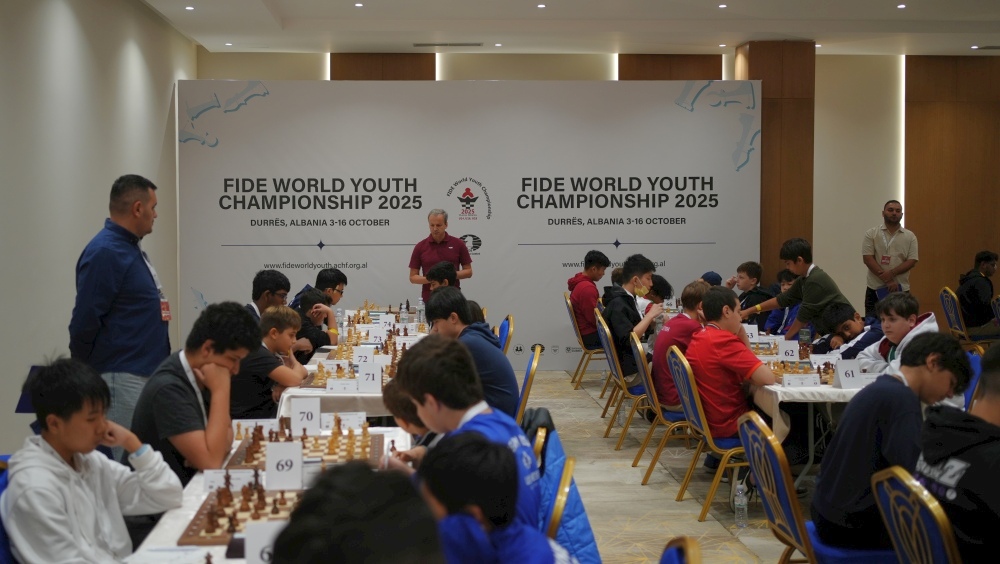
As the FIDE World Youth Chess Championships 2025 passed their halfway mark in Durrës, the atmosphere remains electric. Hundreds of young players from around the world have battled through six rounds with determination, discipline, and sportsmanship — embodying the spirit of chess that unites nations beyond borders. The tournaments across all categories have been fiercely contested, with each round bringing new surprises. Remarkably, after Round 6, only three sole leaders have emerged among the six events: GM Jagadeesh Siddharth (Singapore) tops the standings in the U18 Open, WIM Manon Schippke (France) leads the U18 Girls, and FM Mark Smirnov (Kazakhstan) heads the U14 Open — all scoring 5.5/6. At least two participants are tied for first place in each of the other three tournaments. On October 10, players will enjoy their only rest day, taking the opportunity to recharge before the decisive three rounds ahead. Standings after Round 6: U14 – Girls, U14 – Open, U16 – Girls, U16 – Open, U18 – Girls, U18 – Open “It’s a good time for chess around the globe” In his remarks during the championship, FIDE President Arkady Dvorkovich expressed optimism and pride in the current growth of chess worldwide: “I think it’s a good time for chess around the globe. We have so many events — various levels for top players, young players, senior players, and team competitions. Every month there are several events under the FIDE umbrella, and many federations are developing quite successfully — especially in Asia, with countries like Kazakhstan, Uzbekistan, Turkey, and others.” He also emphasized the social and educational mission of chess, noting how governments are increasingly recognizing its power to teach focus, logic, and resilience: “It’s not just about playing chess or professional competition. The social mission of chess is developing, especially in education. We are trying to make sure it’s inclusive, that everyone is in one boat — and that the boat keeps moving forward.” A message to the young players The FIDE President took a moment to share a personal message with the young participants, who represent the future of the game: “Young players are the future of our chess. I can see they are really fighting, developing their skills, and even using AI tools to train — it’s a different world now. But I hope they also continue learning from good coaches, going deeper into the game. My message is simple: keep your love for chess alive. Play with joy, have fun, and through that, you will become great champions.” Albania’s warm hospitality FIDE President expressed gratitude toward the hosts, acknowledging the strong efforts of the Albanian Chess Federation (FSHSH): “I would like to thank Albania for hosting this great event in such a nice environment. Our Albanian friends are making sure that everyone feels comfortable here, showing their best talents. We hope to have even bigger events in Albania in the future.” Photos: Vlera Zenjullahi and Dardan Bajrami Official website: fideworldyouth.achf.org.al/
Argentine Ministry of Human Capital promotes strengthening of School Chess program

Argentina’s Ministry of Human Capital, headed by Sandra Petrovello, through the National Secretariat of Education led by Carlos Horacio Torrendell, has taken a significant step toward strengthening school chess across the country. This valuable initiative emerged thanks to the efforts of distinguished international authorities – Dana Reizniece-Ozola (Deputy Chair of the FIDE Management Board), Jerry Nash (Chair of the FIDE Chess in Education Commission), and Willy Iclicki (Chair of the FIDE History Commission) – during their visit to Argentina. In line with the projects announced at the School Chess Congress of the Americas, held in Vicente López last year, the National Secretariat of Education, together with the Argentine Chess Federation (FADA) – represented by its Executive Director Mario Petrucci – and FIDE, through Deputy Chair Dana Reizniece-Ozola, has achieved a historic milestone for education and sport through two key actions: The reinstatement of the National Chess Coordinator within the Area of Strengthening Education and Socioemotional Development, a role that will be assumed by Professor Juan Durán. The appointment of 24 provincial representatives – one in each province – who will work together on designing and implementing projects for the Chess in Schools program. Ludovico Grillo, Mario Petrucci, and Alejandro Sass also contributed their expertise to the initiative, supporting the promotion of educational chess in the region. At the same time, the recent creation of the Association of Chess Teachers and Educators (APEA), chaired by Ricardo Luna – a well-known figure with a long track record in school chess – marks another significant advancement. APEA will work in coordination with FADA to expand teacher training and consolidate school programs nationwide. This agreement represents a major milestone in integrating chess into Argentina’s educational system, reinforcing its role as a tool for pedagogy, inclusion, and socioemotional development, in line with the standards promoted by the International Chess Federation (FIDE).
FIDE World Youth U14, U16 & U18 Championship 2025 officially opens in Durrës, Albania
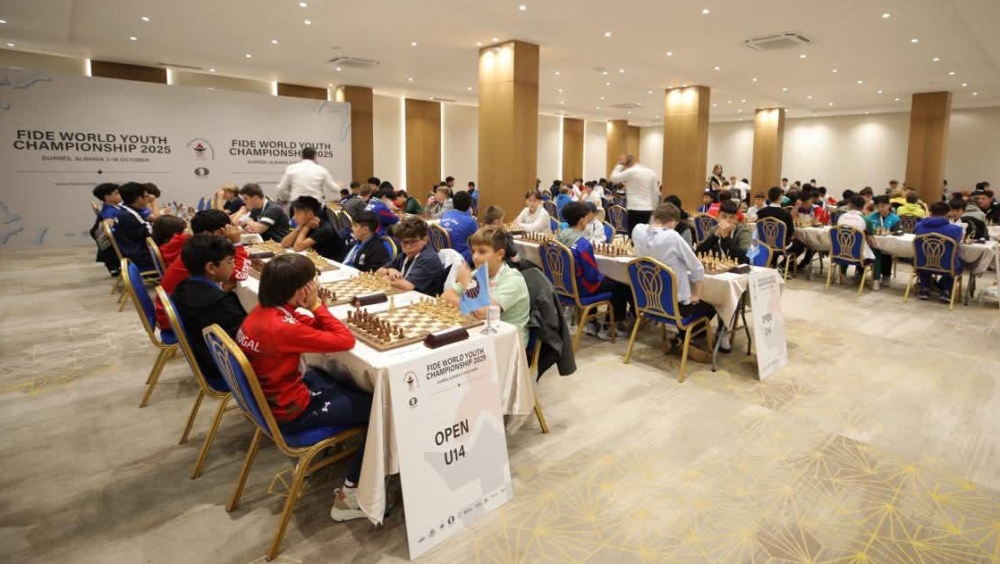
Durrës became the heart of the global chess community this week as the FIDE World Youth Chess Championship U14–U18 2025 officially commenced in this Albanian coastal city. The grand opening ceremony, held at the Grand Blue Fafa Resort, welcomed hundreds of young players, coaches, and guests from around the world, marking the beginning of two weeks of intense and inspiring competition. Organized by the Albanian Chess Federation (FSHS) in partnership with FIDE, the event stands as one of the most significant sporting gatherings ever hosted in Albania — a milestone that reflects both the nation’s growing presence in international chess and its commitment to developing future generations of players. The ceremony brought together an esteemed lineup of speakers and dignitaries, including Dana Reizniece, Deputy Chair of the FIDE Management Board; Erald Dervishi, President of the Albanian Chess Federation; Eduart Shalsi, Honorary President of the Albanian Chess Federation; Fatos Çerenishti, Board Member of the Albanian Chess Federation; Safije Sadiki Shaini, Deputy Minister of Sports of North Macedonia; and Endri Hoxha, Deputy Minister of Tourism, Culture and Sports of Albania. In his welcoming remarks, Erald Dervishi expressed heartfelt gratitude to FIDE and the European Chess Union (ECU) for their trust and support, emphasizing that this championship marks a new chapter for Albanian chess. “We are starting this year with great ambition,” Dervishi said. “This is the beginning of our main project to develop chess throughout Albania and elevate it to a higher level as quickly as possible.” Representing FIDE, Dana Reizniece praised the organization and hospitality of the Albanian hosts, underlining the importance of youth championships in shaping the future of the sport: “Events like this are not only about winning trophies but about creating friendships, learning discipline, and sharing the universal spirit of chess,” she said. Eduart Shalsi, Honorary President of the Albanian Chess Federation, took the stage to thank FIDE, ECU, and all participating nations for their trust in Albania as a host country, wishing the young players a fair and memorable championship. Fatos Çerenishti also addressed the audience, emphasizing the Federation’s continuous effort to grow chess culture and promote the sport across every region of the country. The ceremony concluded with warm messages from Safije Sadiki Shaini and Endri Hoxha, both highlighting the unifying power of sports and the importance of international cooperation in youth development. As the championship officially begins, excitement fills the halls of the Grand Blue Fafa Resort. Young chess prodigies from across the globe are ready to showcase their talent and determination, turning Durrës into a true global stage for the game of kings. The FIDE World Youth Chess Championship 2025 stands as both a celebration of intellect and an inspiring symbol of Albania’s rising role in world chess, a place where the next generation of champions takes their first moves toward greatness. Written by Kevin Dishani Photos: Albanian Chess Federation (FSHS) Official website: fideworldyouth.achf.org.al/
Fabiano Caruana crowned winner of 2025 Grand Chess Tour Finals and overall GCT champion

Fabiano Caruana emerged victorious at the 2025 Grand Chess Tour Finals, defeating Maxime Vachier-Lagrave in an exciting final by a score of 15–13. The champion took home a $150,000 first prize. The 2025 Grand Chess Tour Finals, featuring a $350,000 prize fund, took place from September 26 to October 3 at the WTC Events Center in São Paulo, Brazil. For the first time in history, the event was held in Latin America. The 2025 edition followed a single-elimination knockout format with mixed time controls (2 classical games, 2 rapid games, and 4 blitz games) and the following points distribution: Classical games: 6 points for a win, 3 for a draw, 0 for a loss Rapid games: 4 points for a win, 2 for a draw, 0 for a loss Blitz games: 2 points for a win, 1 for a draw, 0 for a loss Both semifinal matches — Maxime Vachier-Lagrave vs. Praggnanandhaa R. and Fabiano Caruana vs. Levon Aronian — were decided in the faster time controls after all four classical games ended in draws. After a series of draws, Caruana won the third blitz game, which earned him a spot in the final. In the other semifinal, Vachier-Lagrave took the lead by winning the first rapid game, but Praggnanandhaa narrowed the gap by prevailing in the second blitz encounter. However, the Frenchman shattered his opponent’s hopes by taking the third blitz game and advancing to the final. The final match also turned into a thrilling battle in the rapid and blitz segments. After winning the first rapid game and drawing the second, MVL — a renowned blitz specialist — entered the blitz portion of the match with confidence, but Caruana had plans of his own. Somewhat unexpectedly, the American pulled off three straight wins, and sealed the title with a draw in the fourth blitz game. In the match for third place, Aronian convincingly defeated Praggnanandhaa by a score of 20–8. 2025 GCT FINALS RESULTS POSITION NAME COUNTRY PRIZE MONEY 1 GM Fabiano Caruana USA $150,000 2 GM Maxime Vachier-Lagrave FRA $100,000 3 GM Levon Aronian USA $60,000 4 GM Praggnanandhaa R. IND $40,000 “The final game had its own share of drama, but I hope the fans got enjoyment from watching the action,” said Caruana. “It’s an honor to win the 2025 GCT. It’s so prestigious and difficult, especially in match play. I’m thrilled I was able to win this year’s Finals.” “Congratulations to GM Fabiano Caruana on winning this year’s GCT,” said Rex Sinquefield, co-founder of the Saint Louis Chess Club. “Saint Louis was proud to host two exciting legs of the Tour, and we can’t wait to welcome the chess world back next year in our newly expanded club.” “Congratulations to GM Fabiano Caruana on winning the GCT 2025 Finals, and to all players for their incredible performances. For us, helping bring the Tour to São Paulo was a unique opportunity to boost chess in the region. We hope it inspires people of all ages and backgrounds to play chess more, dream big, and achieve greatness,” said Augusta Dragic, President of the Superbet Foundation. Photos: Lennart Ootes and Eric Rosen Official website: grandchesstour.org/
FIDE World Cup 2025: Round one pairings revealed

The Round One pairings for the 2025 FIDE World Cup in Goa have been released, unveiling a slate of exciting early matchups. While most top seeds are automatically placed into Round 2, the opening round still promises compelling encounters as 156 players battle to advance in this elite knockout event. The tournament features 206 participants and serves as a crucial qualifier for the 2026 Candidates Tournament. The top three finishers in Goa will earn direct spots in that highly exclusive competition — putting immense pressure on every round. A detailed tournament preview will be published closer to the November 1st start date. However, the full list of wildcards, host nominees, and last-minute replacements already deserves special attention. The inclusion of some fantastic rising stars and replacements, ensures a dynamic and unpredictable start to the championship. President Dvorkovich’s wildcards While wildcard invitations represent a small fraction of the overall field, they often spotlight the future stars of the game. Nevertheless, the wildcards—special invitations granted outside the standard qualification paths—make up only a small fraction of the 206-player field. “FIDE always works hard to find ways to give talented players a chance to improve and make their mark. The decision to award invites to these five players is based on a mix of recent performance, high-level potential and their contribution to the sport,” FIDE President Arkady Dvorkovich said. The wildcard list leans heavily toward youth, featuring promising talents such as GM’s Mishra, Woodward and Oro, and also a very young World Rapid Champion, GM Murzin. By spotlighting young and emerging players, FIDE is clearly using the wildcard system as a developmental tool—investing in future stars and encouraging their continued growth on the world stage. “The World Cup is one of the most difficult and most exciting chess events, given its knockout format, and will be a great opportunity for these players to show their best facing the best,” Dvorkovich added. Let’s take a quick look at the six wildcard invitees—each a rising talent or notable figure who adds depth and intrigue to the 2025 FIDE World Cup line-up. Kirill Alekseenko (Austria) Photo: Mark Livshitz Born in 1997, Kirill Alekseenko is a seasoned grandmaster who began representing Austria in 2023. A GM since 2015, Alekseenko made headlines by breaking into the 2700+ rating club after finishing third in the 2019 FIDE Grand Swiss, a result that earned him a wildcard to the 2020 Candidates Tournament. With a wealth of top-level experience, Alekseenko remains a formidable presence on the circuit. He has recently posted strong performances in several Spanish Open events and is currently one of the highest-rated players not directly qualified for the 2025 World Cup. According to FIDE CEO Emil Sutovsky, Alekseenko was awarded a wildcard because he was unable to participate in the Grand Swiss in Samarkand due to “circumstances beyond his control.” Given his proven calibre, awarding him a spot was seen as a fair and justified decision. Aleksey Grebnev (FIDE) Photo: Vivian Passig Playing under the FIDE flag, Aleksey Grebnev, born in 2006, claimed his place by defeating fellow prodigy, French Grandmaster Marc’Andria Maurizzi, in a two-game classical match held a few days ago in Serbia. The win earned him the last of the six wildcard invitations, all selected by FIDE President Arkady Dvorkovich. Grebnev’s trajectory has been nothing short of meteoric. He captured the World Under-18 Championship in 2023, followed by the Asian Junior title in 2024, and most recently triumphed at the Dubai Open. With a current FIDE rating of 2611, the 19-year-old is poised to make a serious impact in Goa. In Grebnev’s case, the selection recognizes both his consistent results and his potential to challenge the world’s best on the biggest stages. Abhimanyu Mishra (USA) Photo: Michal Walusza / FIDE Born in 2009 in New Jersey, Abhimanyu Mishra is an American grandmaster widely regarded as one of the most exceptional young talents in global chess. Currently rated 2652, Mishra made history in June 2021 by becoming the youngest grandmaster of all time at just 12 years, 4 months, and 25 days, surpassing the long-standing record held by Sergey Karjakin. Mishra continues to break new ground. At the FIDE Grand Swiss in Samarkand last month, he defeated reigning World Champion GM D. Gukesh in a gruelling 61-move classical game—becoming the youngest player ever to beat a sitting world champion in a classical format. That landmark victory, along with a series of strong performances throughout the tournament, propelled Mishra into the FIDE Top 100, underlining his credentials as a genuine contender among the world’s top juniors and a rising force on the elite circuit. Volodar Murzin (FIDE) Photo: Michal Walusza / FIDE Born in 2006 in Nizhny Tagil, Russia, Volodar Murzin has emerged as one of the brightest young chess talents in recent years. He first gained international attention by winning the European Youth U12 Championship in 2018, followed by a national triumph at the 2020 Russian Junior Championship. Murzin earned the grandmaster title in 2022, but his breakout moment on the world stage came in 2024, when he captured the World Rapid Chess Championship in New York, finishing with an unbeaten score of 10/13. Along the way, he defeated elite players such as Fabiano Caruana, Hikaru Nakamura, and Jan-Krzysztof Duda—a feat that cemented his status as a rising star among the game’s elite. With a current classical rating of 2664, Murzin is now approaching the global top 50, and his rapid ascent makes him a player to watch closely at the 2025 FIDE World Cup. Faustino Oro (Argentina) Photo: Michal Walusza / FIDE Born in 2013 in Buenos Aires, Faustino Oro is an Argentine chess prodigy already being hailed as “the Messi of chess.” He began playing in 2020, during the pandemic, and quickly drew global attention by reaching a FIDE rating of 2300 at just 9 years old—the youngest player ever to do so at the time. In June 2024, Oro broke another record by becoming the youngest International Master in history, earning the
Second International Congress on School Chess announced
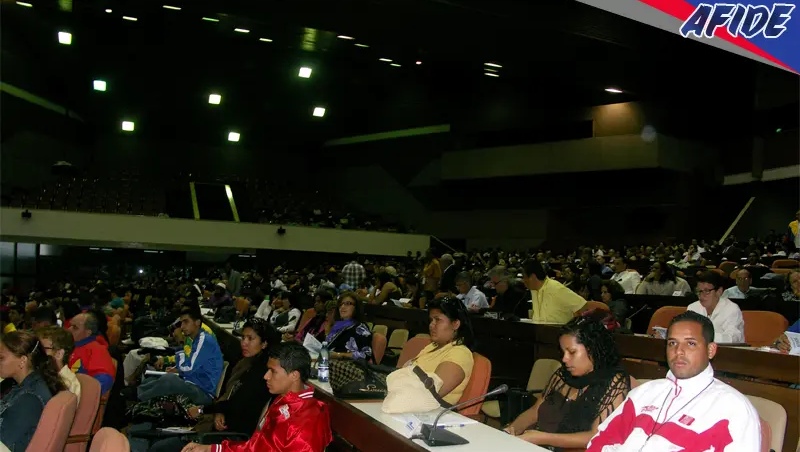
The CCA – FIDE America and the Cuban Chess Federation (FCA) are pleased to invite you to the Second International Congress on School Chess held as a part of the 11th International Convention on Physical Activity and Sports (AFIDE 2025). Event details: Venue: Palace of Conventions, Havana, Cuba Format: Hybrid (on-site and virtual) Schedule: November 10, 2025 – Arrival and accreditation November 11, 2025 – Opening and presentations 10:00 a.m. – Official opening 2:00 p.m. – 5:00 p.m. – Paper presentations November 12, 2025 – Working sessions 9:00 a.m. – 12:00 p.m. – Morning session 2:00 p.m. – 5:00 p.m. – Afternoon session November 13, 2025 – Special activities 10:00 a.m. – Simultaneous exhibition at the Sports City 1:30 p.m. – Lunch 2:30 p.m. – Visit to the ISLA Study Center 3:30 m. – 4:00 p.m. – Transfer to the National Youth Sports School (ESPA) 4:00 p.m. – 5:00 p.m. – Guided tour at the National Youth Sports School (ESPA) November 14, 2025 – Closing Ceremony Special participation: WGM Dana Reizniece-Ozola – Deputy Chair of the FIDE Management Board and Deputy President of the European Chess Union. Jose Carrillo Pujols – President of the Chess Confederation of the Americas. Rita Atkins – Secretary of the FIDE Chess in Education Commission. IM Mauricio Arias – Chair of the FIDE America Chess in Education Commission Who can participate? Teachers, assistants, coaches, athletes, arbiters, journalists, students, organizers, and anyone interested in understanding and promoting chess in the educational field, from preschool to university level. The registration fee includes: Access to conferences, presentations, expert panels, poster sessions, the exhibition fair, and associated events (except those convened exclusively for members of the organizing institutions) Access to accepted papers, published with an ISBN in the event’s summary book (AFIDE 2025) Certificate of participation (1 academic credit). For those presenting a paper: certificate of authorship (2 academic credits), delivered via email Modes of participation On-site: 5 minutes for presentation + 5 minutes for audience questions Streaming: 10 minutes live connection and 5 minutes for audience questions Recording: Pre-recorded presentation with a maximum duration of 10 minutes Invitation letter: English, PDF; Spanish, PDF AFIDE official website: afide.inder.gob.cu/
Iniyan P wins Indian Chess Championship 2025
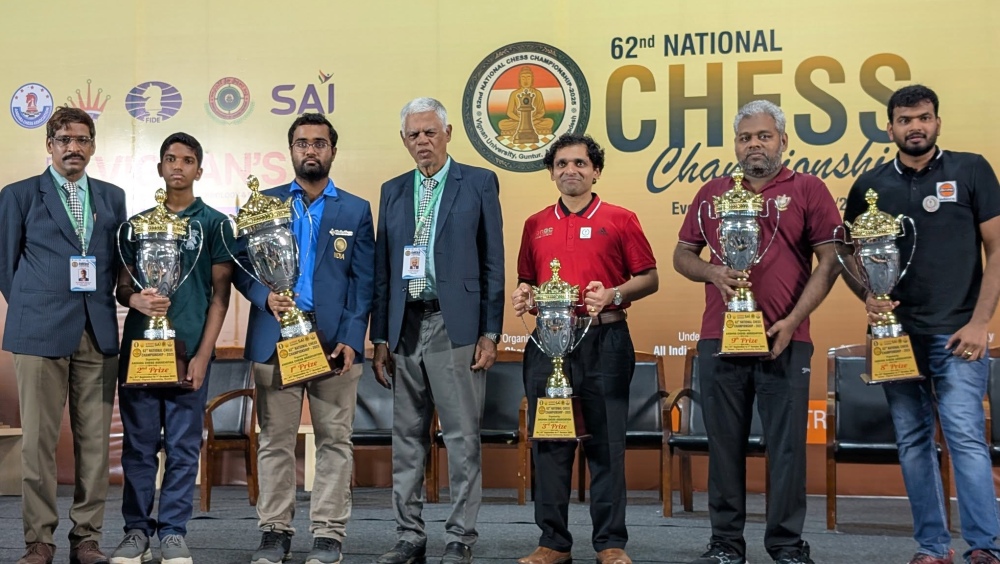
Panneerselvam Iniyan emerged as the winner of the 2025 Indian Chess Championship, edging out Goutham Krishna on tiebreak to claim his maiden national title. The 62nd National Chess Championship, an 11-round Swiss tournament with classical time control, took place at Vignan University, Guntur, Andhra Pradesh, from September 21 to October 1. Although the event did not attract all of India’s top players, it still boasted a massive field of 394 participants, including 14 GMs and 30 IMs. Top seed Iniyan P entered the competition as one of the pre-tournament favorites, but his path to the title was far from straightforward. Trailing the leaders for most of the way, he faced sole leader Krishnan Sasikiran in the penultimate round. In a game of paramount importance to both players, Iniyan seized his opportunity when Sasikiran faltered in a drawn endgame, failing to find the only move that would have secured a half-point. Heading into the final round half a point ahead of four rivals, Iniyan drew with Abhijeet Gupta and clinched the title with 9/11. Despite winning his last-round game and catching Iniyan, Goutham Krishna had to settle for silver due to an inferior Buchholz (the first tiebreak criterion). With this victory, Iniyan now holds the Indian National Champion title in both Classical and Rapid chess, having previously won the rapid championship in March 2025. As many as six players tied for third on 8½/11, with Sasikiran taking bronze on tiebreaks. Final standings (chess-results) Photos: Shahid Ahmed Official website: apchess.org/

